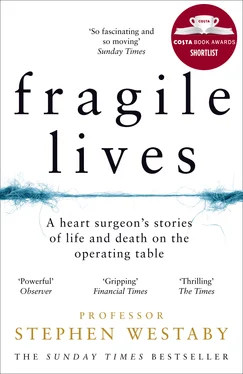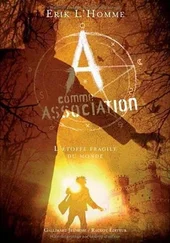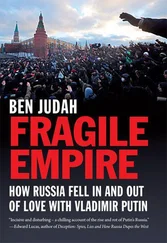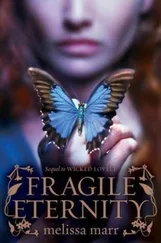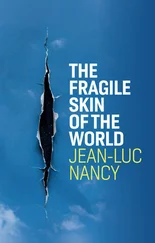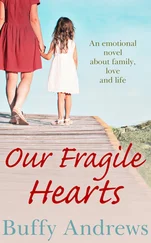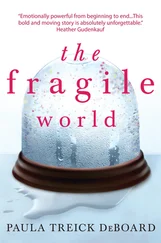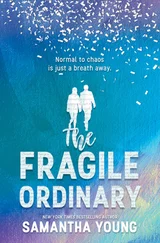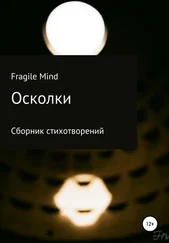Welcome to cardiac surgery.
I sat there, arms on the rail, chin on my hands, staring down from the ether dome at the black rubber surface of the empty operating table, as generations of would-be surgeons had done before me. The ether dome was a gladiatorial amphitheatre, people coming here to gaze down on a spectacle of life or death. Perhaps if others had been there it might have seemed less brutal, others with whom to share the shock of this poor girl’s death, the misery awaiting her child.
Auxiliary nurses came with mops and buckets to erase the last traces of her – her blood now dry on the floor around the operating table, the bloody footprints heading towards the door, the blood on the anaesthetic machine, the blood on the operating lights. Blood everywhere – now meticulously wiped up. A slip of a girl reaching up to clean the operating light saw me in the dome, my pale face and staring eyes against the gloom. I frightened her, and so it was my cue to leave. But one spot of blood remained on top of the light where no one could see. Adherent and black, it said part of me is still here. Remember me.
The green door closed behind me and I walked away to the shuddering lift where her body had been taken down to lie in a cold fridge in the mortuary.
Notice of autopsies were posted on a board in the entrance hall of the medical school. Usually the patients were elderly. The young ones were either drug addicts, road-traffic accidents, suicides from the underground system or cardiac surgery patients. I found her on the list for Friday morning. She was called Beth. Not Elizabeth, just Beth. She was twenty-six years old. It had to be her. On the day of the autopsy the bodies were brought from the hospital mortuary in the basement, then dragged under the road to the medical school in a tin box on rails by a pulley system and up the lift to the autopsy room. Should I go? Should I watch her guts and brain be cut out, watch her dead heart be carved into slices, tell them how she really died in that crimson fountain?
No, I couldn’t do it.
Beth taught me a very important lesson that day in the ether dome. Never get involved. Walk away as her surgeons did and try again tomorrow. Sir Russell Brock, the most renowned heart surgeon of the era, was known for his bluntness about losing patients – ‘I have three patients on my operating list today. I wonder which one will survive.’ This may seem insensitive, even callous, but to dwell on death was a dreadful mistake then, and it still is now. We must learn from failure and try to do better the next time. But to indulge in sorrow or regret brings unsustainable misery.
I grappled with this later in my career when my interests veered towards the sharp end: heart surgery for complex congenital anomalies in babies and young children. Some came toddling happily into the hospital, teddy bear in one hand, Mummy holding the other. Blue lips, little chest heaving, blood as thick as treacle. They’d never known a different life and I strived to provide that for them. To make them pink and energetic, liberate them from impending doom. I did this in good faith, yet sometimes without success. So what should I do? Sit with the weeping parents in a dark mortuary holding a cold, lifeless hand, blaming myself for taking that risk?
All heart surgery is a risk. Those of us who make it as surgeons don’t look back. We move on to the next patient, always expecting the outcome to be better, never doubting it.
2
Courage is doing what you’re afraid to do. There can be no courage unless you’re scared.
Edward V. Rickenbacker, The New York Times Magazine , 24 November 1963
It was at the very start of the post-war baby boom that I arrived into the world in the maternity department of Scunthorpe War Memorial Hospital on 27 July 1948, star sign Leo. Good old Scunthorpe, my childhood home for eighteen years, a steel town and the long-suffering butt of music-hall jokes.
My dear mother, exhausted after a long and painful labour but happy with her first child, brought me safely back home from the carnage of the delivery suite. I was a pink, robust son, wailing from the depths of his newly expanded lungs.
My mother was an intelligent woman, caring, gentle and well liked. During the war she’d managed a small high-street bank, and with other tills empty the old folks would still queue to tell her their troubles. My father joined the RAF at sixteen to fight the Germans, and after the war he got a job in the local Co-operative grocery department and worked hard to improve our circumstances. Life wasn’t easy.
We were church-mice poor in a grimy council estate. House number 13, no pictures allowed on the walls in case the plaster crumbled, with a corrugated tin air-raid shelter in the back garden that housed geese and chickens – and the outside toilet.
My maternal grandparents lived directly across the street. Grandmother was kindly and protective of me, but frail. Grandfather worked at the steelworks and during the war had been the local air-raid warden. On pay day I’d go with him to the works to collect his wages. There I was intrigued by the spectacle of white-hot molten metal being poured into ingots, bare-chested, sweaty men in flat caps stoking the furnaces, steam trains belching fire, clanking up and down between the rolling mills and the slag heaps, and sparks flying everywhere.
Grandfather patiently taught me how to draw and paint. He’d sit over me, puffing away on Woodbines as I painted red night skies over the chimneys, street lamps and railway trains. Grandfather smoked twenty a day and spent his whole life working in smoke at the steelworks. Not the best recipe.
In 1955 we got our first television set, a 10-inch-square box with a grainy black-and-white picture and just one channel, the BBC. Television dramatically widened my awareness of the outside world. That year two Cambridge scientists, Crick and Watson, described the molecular structure of DNA. In Oxford the physician Richard Doll linked smoking with lung cancer. Then came exciting news on a programme called Your Life in Their Hands that would shape the rest of my life. Surgeons in the United States had closed a hole in the heart with a new machine. They called it the heart–lung machine, because it did the job of both organs. The television doctors wore long white coats down to the floor, the nurses had fine, starched uniforms and white caps and rarely spoke, and the patients sat stiffly to attention with their bed sheets folded back.
The show talked about heart operations and how surgeons at the Hammersmith Hospital would attempt one soon. They too would close holes in the heart. This seven-year-old street kid was captivated. Quite mesmerised. Right then I decided that I would be a heart surgeon.
At ten I passed the tests for entry to the local grammar school, and by then I was quiet, compliant and self-conscious. As one of the ‘promising’ set I was forced to work hard. I was a natural in art, although I had to stop those classes in favour of academic subjects. But one thing was clear. I was good with my hands, and my fingertips connected with my brain.
One afternoon after school I was out walking with Grandfather and his Highland terrier Whisky on the outskirts of town when he stopped dead on a hill, clutching the collar of his cloth shirt. His head bowed, his skin turned ashen grey and, sweating and breathless, he sank to the ground like a felled tree. He couldn’t speak and I saw the fear in his eyes. I wanted to run and fetch the doctor but Grandfather wouldn’t let me. He couldn’t risk being off work, even at the age of fifty-eight. I just held his head until the pain abated. It lasted thirty minutes, and once he’d recovered we slowly made for home.
His ill health wasn’t news to my mother. She told me that he’d been getting a lot of ‘indigestion’ while cycling to work. Reluctantly, Grandfather agreed to get off the bike, but it didn’t do much good. The episodes became more frequent, even at rest, and especially when he climbed the stairs. Cold was bad for his chest, so the old iron bed was brought down in front of the fire and the commode was carried inside to save a journey outdoors.
Читать дальше
